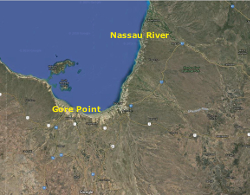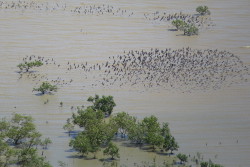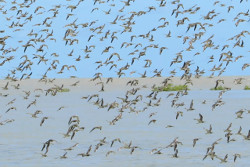|
|
Shorebirds South East Gulf of CarpentariaThe south east Gulf of Carpentaria is an important site for shorebirds, not only in Queensland and Australia, but for the international Flyway. Half of the migratory shorebirds that occur along the Queensland coastline can be found in the south east Gulf of Carpentaria. The coastline here has extensive supra-tidal claypans, very wide tidal flats, large estuaries and neighbouring freshwater wetlands making access to the coastline very difficult. The Gulf of Carpentaria has an unusual tidal regime of mostly one high tide and one low tide each day and the time of the high tide changes seasonally, which is different from all other parts of Queensland. Queensland shorebird species - Bird wetland indicator species and profiles Quick facts
Shorebirds in the south east Gulf of Carpentaria roost on beach ridges, muddy shores, or behind mangroves on partially flooded claypans. There are many roost sites available where the height of the tide, as well as prevailing winds, determines which roost sites will be used at any one time. High numbers of shorebirds can occur between the Nassau River and west of Tarrant Point. Shorebird density is highest within 30 km to the north of Karumba. Parts of the coastline in this region, are used more intensively in some seasons than in others. For example, the coastline to the west of Gore Point near Burketown has a high density of great knot and red knot during the period of southward migration. To the east of Gore Point, the densities of black-tailed godwit, common greenshank and sharp-tailed sandpiper are at a peak later in the year, prior to the wet season. The coastal shorebird community is composed of mostly migratory species. In winter, only about 10% of birds are resident shorebirds, consisting mostly of Australian pied oystercatcher, black-winged stilt and red-capped plover. The masked lapwing, black-winged stilt and red-necked avocet also have significant sub-coastal populations. The region is important for shorebirds not making the northward migration e.g. young birds or non-breeding adults that either stay in the area, or arrive from farther south. Winter numbers of all shorebirds is as much as 30% of the numbers in the summer. The great knot and red knot contributes over half the total number of shorebirds for the region. Greenshank, marsh sandpiper and sharp-tailed sandpiper are common. These species also use sub-coastal habitats after the beginning of highly seasonal rainfall in the region. Red-necked stint are common over winter months and during the latter half of the year prior to the wet season when they move to southern and eastern parts of Australia. In April, additional red knots arrive from New Zealand as they migrate north. The importance of the south east Gulf of Carpentaria for shorebirds was highlighted by the addition of two sites to the international East Asian—Australasian Flyway Partnership Site Network. Additional informationIndigenous rangers in the Gulf of Carpentaria monitor shorebirds in the region. AcknowledgementsThis information has been compiled by the Queensland Wader Study Group with input from the Queensland Parks and Wildlife Service, researchers and volunteers (from Australasian Wader Study Group, Birds Queensland, the Port Curtis Wader Study Group, the Wildlife Preservation Society of Queensland, Birds Australia and the Mackay Conservation Group). These pages are primarily sourced from the report prepared by the Queensland Ornithological Society Inc for the Queensland Department of Environment and Heritage Protection and the Australian Heritage Committee, Driscoll, P. V. 1995. Survey of wader and waterbird communities along the central Queensland coast. Please note the information above is based on the best available at the time of publication. Last updated: 2 February 2021 This page should be cited as: Department of Environment, Science and Innovation, Queensland (2021) Shorebirds South East Gulf of Carpentaria, WetlandInfo website, accessed 8 May 2025. Available at: https://wetlandinfo.des.qld.gov.au/wetlands/ecology/components/biota/fauna/fauna-taxon/birds/shore-bird/migratory-qld/south-east-gulf-carpentaria.html |

 — Department of the Environment, Tourism, Science and Innovation
— Department of the Environment, Tourism, Science and Innovation





